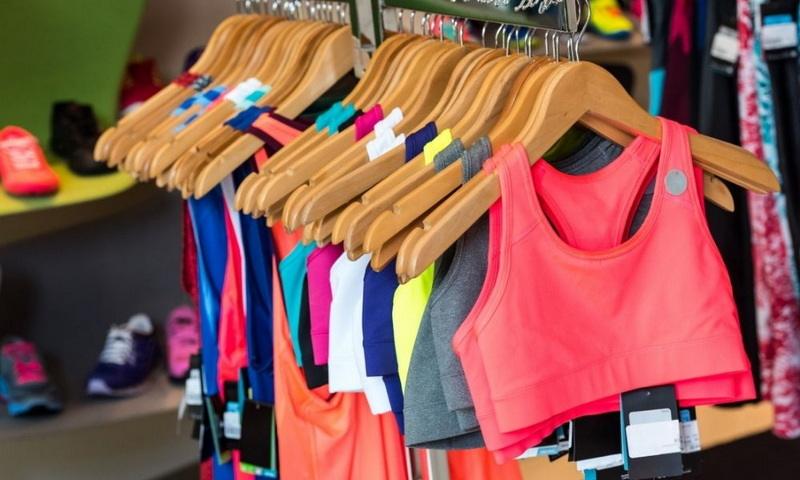Content Menu
● The Strategic Role of Custom Sports Apparel in Team Dynamics
>> Enhancing Team Unity and Belonging
>> Boosting Confidence and Performance
● Supply Chain and Production Innovations Driving Customization
>> Automation and On-Demand Manufacturing
>> Balancing Customization with Scalability
>> Supply Chain Resilience and Sustainability
● The Impact on Brand Identity and Market Positioning
>> Strengthening Fan Engagement and Sponsorship Value
>> Innovation as a Differentiator in the Market
● Sustainability and Future Trends
>> Smart Fabrics and Wearable Technology
>> Circular Economy and Ethical Manufacturing
● Frequently Asked Questions (FAQ)
>> 1. How does custom sports apparel improve team morale?
>> 2. What technological innovations support fast custom sportswear production?
>> 3. Can custom sports apparel enhance athletic performance?
>> 4. How does custom apparel contribute to brand identity?
>> 5. What are the future trends in custom sports apparel?
In the competitive world of sports, success hinges not only on skill and strategy but also on the intangible elements of team morale and unity. Custom sports apparel has emerged as a powerful tool that transcends mere aesthetics to foster a strong sense of identity, pride, and cohesion among team members. This article explores the multifaceted ways in which custom sports apparel enhances team morale and unity, drawing on insights from product development, supply chain management, and technical innovation in the sportswear industry.

The Strategic Role of Custom Sports Apparel in Team Dynamics
Custom sports apparel serves as a visual and psychological anchor for teams. By incorporating team logos, colors, and personalized elements such as player names and numbers, apparel creates a unified identity that reinforces the notion that each member is part of a larger collective working toward a common goal. This shared identity is crucial in building camaraderie and promoting collaboration on and off the field.
Enhancing Team Unity and Belonging
Wearing matching custom apparel instills a sense of belonging among team members. It signals that every individual is integral to the team’s success, breaking down barriers and fostering inclusivity. This unity is especially important in diverse teams where members may come from different backgrounds or play different roles. Custom apparel levels the playing field, creating a cohesive environment that encourages mutual support and teamwork.
Moreover, the psychological effect of uniformity in appearance cannot be overstated. When athletes don identical jerseys or warm-up gear, it reduces individual distractions and emphasizes collective goals. This visual cohesion can translate into stronger communication and trust during practice sessions and competitions, which are vital for executing complex plays and strategies.
Boosting Confidence and Performance
Custom sportswear not only unifies but also empowers athletes. When players look professional and feel comfortable in high-quality, performance-oriented apparel, their confidence rises. This psychological boost translates into improved focus and effort during competitions. Moreover, custom apparel designed with advanced materials-such as moisture-wicking fabrics, breathable mesh panels, and ergonomic cuts-enhances comfort and athletic performance, demonstrating the intersection of product development and sports science.
The technical design of custom sports apparel often incorporates athlete-specific needs. For example, compression zones can improve blood circulation and reduce muscle fatigue, while ventilation zones help regulate body temperature during intense activity. These performance-enhancing features contribute to athletes feeling physically prepared and mentally ready, which is essential for optimal performance.
Additionally, customization goes beyond aesthetics and comfort. It allows for functional adaptations based on the sport, position, or even individual player preferences. For instance, basketball jerseys might prioritize lightweight materials and stretchability, while football uniforms focus on durability and impact resistance. This level of tailored product development ensures that apparel supports, rather than hinders, athletic output.
Supply Chain and Production Innovations Driving Customization
The ability to deliver fully customized sports apparel efficiently and cost-effectively has historically been challenging due to complex supply chains and production constraints. However, recent technological advancements and supply chain innovations have transformed this landscape.
Automation and On-Demand Manufacturing
End-to-end automation platforms now enable teams to design, order, and receive custom sportswear in remarkably short turnaround times-sometimes within days-without compromising quality or cost. This is achieved through patented technologies that streamline the workflow from digital design to production, leveraging local supply chains to reduce lead times and environmental impact. Such agility in manufacturing allows for smaller minimum order quantities and faster delivery, meeting the growing demand for personalized team apparel.
These automated systems integrate digital design tools that allow teams to preview and modify apparel in real time, ensuring satisfaction before production begins. The digital-to-physical pipeline eliminates traditional bottlenecks such as manual pattern making and lengthy sampling processes. This innovation not only accelerates time-to-market but also reduces waste by minimizing errors and overproduction.
Balancing Customization with Scalability
Scalable customization requires flexible manufacturing processes that accommodate variability in designs and sizing without sacrificing production efficiency. By integrating AI-driven design tools and digital printing technologies, manufacturers can produce unique, made-to-order apparel at unit costs comparable to mass production. This balance is critical for sports teams and brands seeking to maximize impact while managing budgets and timelines.
Digital textile printing, for example, enables complex, multi-color designs to be produced without the need for traditional screen printing setups, which are costly and time-consuming for small runs. This technology allows for vibrant, durable graphics that maintain their quality through repeated washes and wear. Furthermore, modular manufacturing lines can switch between different apparel types and customization levels seamlessly, offering unparalleled versatility.
Supply Chain Resilience and Sustainability
Modern supply chains supporting custom sports apparel emphasize resilience and sustainability. By sourcing materials closer to production facilities and adopting just-in-time inventory models, companies reduce lead times and carbon footprints. This localized approach also mitigates risks associated with global disruptions, such as shipping delays or raw material shortages.
Sustainability initiatives include the use of recycled polyester, organic cotton, and low-impact dyes, which contribute to eco-friendly apparel without compromising performance. Additionally, some manufacturers implement closed-loop systems where worn-out garments are collected and recycled into new products, aligning with circular economy principles.

The Impact on Brand Identity and Market Positioning
Custom sports apparel extends beyond team morale to influence brand identity and market presence. For sports organizations and sponsors, apparel acts as a mobile billboard, showcasing logos and colors that enhance recognition and loyalty among fans and stakeholders. This branding function is amplified when apparel is stylish and performance-oriented, positioning teams as professional and formidable competitors.
Strengthening Fan Engagement and Sponsorship Value
Custom apparel also plays a key role in fan engagement. When fans wear replica jerseys or merchandise that mirrors the team’s custom designs, it creates a sense of community and shared passion. This emotional connection drives merchandise sales and deepens loyalty, which is vital for the financial health of sports organizations.
Sponsors benefit from custom apparel through enhanced visibility. Prominent logo placement on jerseys and warm-up gear maximizes brand exposure during games and media coverage. The ability to customize apparel also allows sponsors to tailor their branding strategies to specific events, campaigns, or player endorsements, increasing marketing effectiveness.
Innovation as a Differentiator in the Market
In an increasingly saturated sports apparel market, innovation in customization and product development serves as a key differentiator. Brands that invest in cutting-edge materials, smart textiles, and personalized design experiences position themselves as leaders. This reputation attracts professional teams, amateur clubs, and individual athletes who seek apparel that reflects their identity and supports their performance.
For example, integrating wearable technology such as biometric sensors into custom apparel can provide real-time data on player health and performance, opening new avenues for training optimization and injury prevention. These innovations not only enhance the product offering but also deepen the relationship between apparel providers and their customers.
Sustainability and Future Trends
The future of custom sports apparel is shaped by increasing consumer demand for sustainability and ethical manufacturing. Brands are adopting eco-friendly materials and processes to reduce waste and environmental footprint, aligning with broader market trends toward responsible production. Additionally, technology integration-such as AI-generated designs and smart fabrics-is poised to redefine customization, offering teams innovative ways to express identity while optimizing performance.
Smart Fabrics and Wearable Technology
Smart fabrics embedded with sensors can monitor physiological parameters such as heart rate, hydration levels, and muscle fatigue. When integrated into custom sports apparel, these technologies provide coaches and athletes with actionable insights that enhance training and recovery protocols. This convergence of apparel and technology represents the next frontier in personalized sportswear.
AI and Data-Driven Design
Artificial intelligence is revolutionizing the design process by analyzing trends, performance data, and customer preferences to generate optimized apparel designs. AI tools can suggest color schemes, fabric combinations, and ergonomic features tailored to specific sports or individual athletes, accelerating product development cycles and improving customization accuracy.
Circular Economy and Ethical Manufacturing
Sustainability efforts are increasingly focused on circular economy principles, where apparel is designed for longevity, recyclability, and minimal environmental impact. Ethical manufacturing practices ensure fair labor conditions and transparency throughout the supply chain, which are becoming critical factors for consumers and organizations when selecting apparel partners.
Conclusion
Custom sports apparel is a strategic asset that significantly boosts team morale and unity by fostering a shared identity, enhancing confidence, and promoting inclusivity. Advances in technology and supply chain management have made it possible to deliver fully customized, high-performance apparel quickly and cost-effectively, enabling teams to stand out both on and off the field. Investing in custom sportswear is not just about aesthetics; it is a business-savvy decision that drives team cohesion, performance, and brand value.
If you are ready to elevate your team’s spirit and performance with expertly crafted custom sports apparel, contact us today to explore how our cutting-edge solutions can meet your unique needs and timelines.

Frequently Asked Questions (FAQ)
1. How does custom sports apparel improve team morale?
Custom sports apparel creates a sense of belonging and pride among team members by visually uniting them under a common identity. This fosters camaraderie and motivation, which directly enhance morale and teamwork.
2. What technological innovations support fast custom sportswear production?
Automation platforms and patented end-to-end manufacturing technologies enable rapid design-to-production workflows. These systems allow teams to customize apparel and receive finished products in days, leveraging local supply chains for speed and cost efficiency.
3. Can custom sports apparel enhance athletic performance?
Yes. Custom apparel often incorporates advanced fabrics and ergonomic designs that improve comfort, moisture management, and mobility, which can positively impact athletes’ performance during competition.
4. How does custom apparel contribute to brand identity?
By featuring team logos, colors, and personalized elements, custom apparel increases visibility and recognition for teams and sponsors. This strengthens brand loyalty and projects a professional image to fans and competitors alike.
5. What are the future trends in custom sports apparel?
Key trends include the integration of AI-driven design, sustainable and ethical manufacturing practices, and the development of tech-enabled clothing. These innovations will make customization more accessible, environmentally responsible, and performance-oriented.
Hot tags: custom sports and apparel, China, Global, OEM, private label, manufacturers, factory, suppliers, manufacturing company
